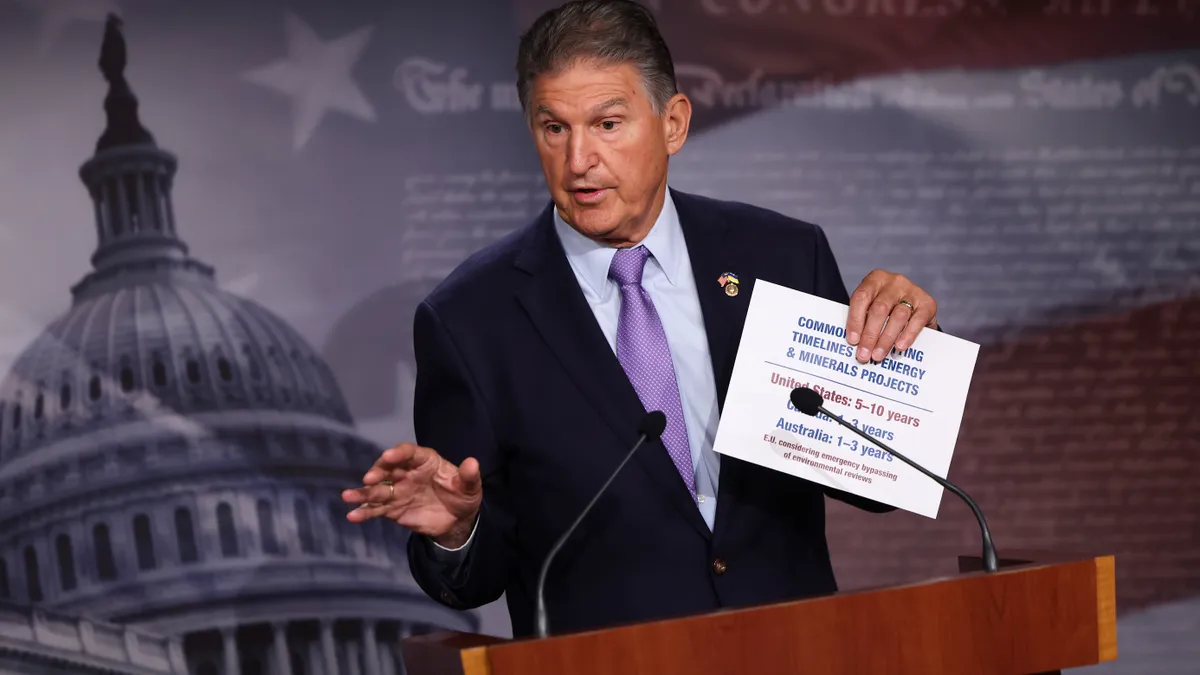Dive Brief:
-
Sen. Joe Manchin, D-W.Va., on Wednesday released permitting reform legislation that allows the Department of Energy to designate proposed transmission projects to be in the national interest and the Federal Energy Regulatory Commission to approve them if they meet certain conditions.
-
FERC would be able to allocate the costs of those projects to ratepayers that benefit from them, according to a summary of the legislation. The proposal could be included in a continuing resolution to keep funding the federal government after this fiscal year ends on Sept. 30.
-
Renewable energy trade groups such as the American Clean Power Association, or ACP, support the bill, but a group of at least 77 House members and organizations including the Climate Justice Alliance, the Clean Air Council and the League of Conservation Voters oppose it, partly over concerns it would weaken environmental reviews for energy infrastructure. Some Democratic senators also oppose it.
Dive Insight:
When Manchin in late July provided pivotal support for the Inflation Reduction Act, which includes $369 billion in energy security and climate spending over 10 years, Senate Majority Leader Chuck Schumer, D-N.Y., House Speaker Nancy Pelosi, D-Calif., and President Joe Biden agreed to include permitting reform legislation in the upcoming continuing resolution.
Manchin and others contend that permitting reform is needed to lower U.S. energy costs.
“No matter what you want to build, whether it's transmission pipelines or hydropower dams, more often than not, it takes too long and drives up costs,” Manchin said. “You can double your cost within a five to six, seven-year period from what the original cost may have been.”
The bill requires the president to designate 25 strategically important energy and mineral projects that would receive priority federal review. The legislation directs the president to prioritize projects that reduce energy prices, lower greenhouse gas emissions and improve electric reliability, among other things, according to the summary.
The bill aims to speed environmental reviews for major energy and natural resource projects under the National Environmental Policy Act. Federal agencies would be required to try to finish environmental impact statements within two years, environmental assessments within a year, and all required authorizations for construction within 180 days after the environmental reviews are completed, according to the summary.
The bill sets a 150-day statute of limitations for court challenges and requires courts to give agencies no more than 180 days to act on remanded or vacated permits, according to the summary.
The bill also clarifies that FERC has jurisdiction over interstate hydrogen pipelines.
It requires federal agencies to approve the long-delayed and partly built Mountain Valley natural gas pipeline, which is set to run from Manchin’s home state to southern Virginia. The agencies would have to issue various key permits within 30 days, and the permits would be exempt from judicial review. Any challenges to that provision would be handled by the U.S. Court of Appeals for the District of Columbia Circuit.
Renewable energy advocates are backing the legislation, saying it will spur transmission development.
“Making common-sense reforms to our current permitting process will help us unleash the full potential of the clean energy investments spurred by the Inflation Reduction Act and keep us within striking distance of the emissions reduction targets and climate goals we need to achieve,” Heather Zichal, ACP CEO, said.
The Clean Energy Buyers Association, which represents companies and nonprofit energy consumers, urged Congress to support bipartisan efforts on permitting reform.
“Expanding transmission capacity through these reforms will lead to significantly reduced costs for customers by more efficiently moving least-cost power; improved grid reliability by connecting available power across broader regions; and decreased pollution by integrating greater amounts of clean energy,” Bryn Baker, CEBA’s senior director of market and policy innovation, said.
The legislation will likely be challenged by some House Democrats. House Natural Resources Committee Chair Raúl Grijalva, D-Ariz., on Wednesday said the bill could produce a standoff over the must-pass continuing resolution.
The bill includes measures long-sought by the fossil-fuel industry, including “shortened public comment periods, fewer avenues for communities to fight back against projects polluting their communities, and weakened enforcement of bedrock environmental and public health laws,” Grijalva said.
Unlike the Inflation Reduction Act — a budget reconciliation measure that only needed a majority vote to clear the Senate — the continuing resolution will need at least 60 votes to pass.
Some Democratic senators have raised concerns about the bill, including Sens. Edward Markey, D-Mass., and Tim Kaine, D-Va. Markey said it shouldn’t be part of the continuing resolution, while Kaine said he opposed it because it would approve the Mountain Valley pipeline and exempt it from “full administrative and judicial review.”
Also, the bill may fail to garner Republican support, which will be needed to pass the Senate. Republicans earlier this month released more extensive permitting reform legislation.
Groups like the Center for Biological Diversity oppose the Manchin bill, saying it will lead to weaker environmental reviews, especially for fossil fuel-related projects.
“We don’t need to gut the Clean Water Act and other bedrock environmental laws to build out wind and solar energy,” said Brett Hartl, the Center for Biological Diversity’s government affairs director. “Any member of Congress who claims this disastrous legislation is vital for ramping up renewables either doesn’t understand or is ignoring the enormous fossil fuel giveaways at stake.”















